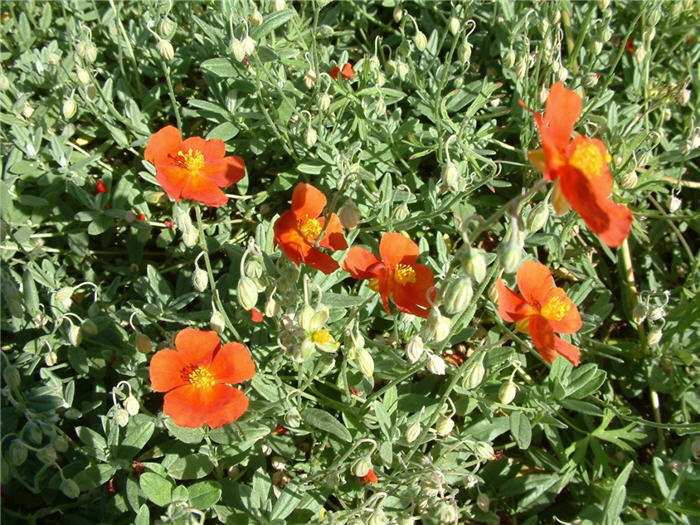| Botanical Name: Helianthemum nummularium | |
| Common Name: Rock Rose |

-
Anatomy
-
Culture
-
Design
Plant Type
Ground cover, Perennial
Height Range
Under 1'
Flower Color
Orange, Red, Yellow, White
Flower Season
Spring
Leaf Color
Green, Grey Green
Bark Color
Grey
Fruit Color
n/a
Fruit Season
n/a
Sun
Full, Half
Water
Low
Growth Rate
Moderate
Soil Type
Sandy, Clay, Loam, Rocky, Unparticular
Soil Condition
Average, Rich, Poor, Well-drained, Dry
Soil pH
Neutral, Basic
Adverse Factors
n/a
Design Styles
English Cottage, Mediterranean, Ranch, Spanish
Accenting Features
Showy Flowers
Seasonal Interest
Spring
Location Uses
Perennial Border, Shrub Border, Parking Strip, With Rocks
Special Uses
Cascade, Erosion Control, Mass Planting, Fire Resistant
Attracts Wildlife
n/a
Information by: Stephanie Duer
Photographer: Steve Mullany
Photographer: Steve Mullany
-
Description
-
Notes
Rock Rose is a charming, low growing perennial that blooms late spring to early summer. Simple five-petaled flowers come in shades of red, apricot, orange, yellow, pink, rose, and white. Plants are 6 or so inches high and spread to 18 inches. Leaves are green to grey-green and are finely textured. Unlike some spring bloomers, Rock Rose has very nice summer foliage, making it an good choice for a groundcover, though one that doesn't receive foot traffic.
Grow in well drained soil and full sun to part shade. Deadheading isn't necessary, but cutting the whole plant back by a third in mid summer can result in more dense foliage and, sometimes, a second blooming in the fall, though it will be less showy. In mild winters, foliage may be evergreen, but summer sun may score the leaves; evergreen boughs are useful as a protective cover. There are helianthemum planted at the Washington Square Conservation Garden.